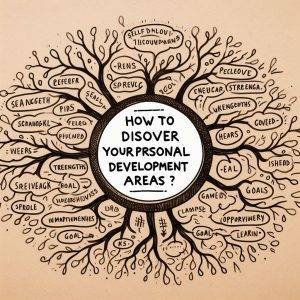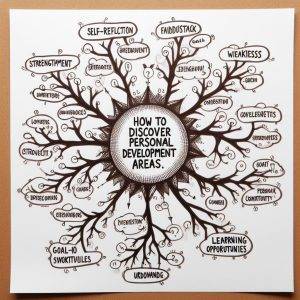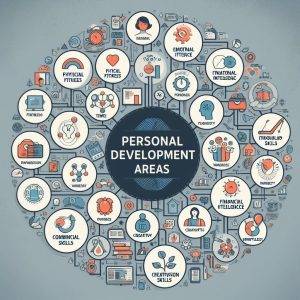Introduction
Personal development is a journey of self-discovery and growth, aimed at enhancing various aspects of your lives. Identifying areas for personal development is the first step toward realizing your full potential.
Now, do you want to engage in personal development and just don’t know which areas of your life to begin with? If yes, then you are in the right place.
This article aims to provide you with guidance on how to discover your personal development areas effectively. Let’s jump in, shall we?
What is Personal Development?
Before digging into how you can discover your personal development areas, let’s first have a clear understanding of what personal development means…
Personal development, often referred to as self-improvement or self-growth, is the ongoing process of enhancing your skills, knowledge, abilities, and overall well-being.
It encompasses various aspects of your life, ranging from physical, mental, and emotional to spiritual dimensions. It involves setting goals, cultivating positive habits, and taking deliberate actions to reach your fullest potential and lead a fulfilling life.
What are the Key Elements of Personal Development?
Here are the key elements of personal development that you should know:
- Self-awareness
Self-awareness involves understanding yourself – which includes understanding your strengths, weaknesses, values, beliefs, and emotions. Self-awareness is essential for identifying your areas for improvement and setting meaningful goals.
- Goal-setting
Goal setting involves establishing clear and specific objectives for personal growth and development. Goals provide direction and motivation, guiding you toward desired outcomes and aspirations.
- Continuous learning
This involves engaging in lifelong learning and acquiring new knowledge, skills, and experiences. Continuous learning fosters personal growth, adaptability, and resilience in the face of challenges and opportunities.
- Personal growth
Includes actively seeking opportunities for growth and expansion in various areas of your life, including your career, relationships, health, and spirituality. Personal growth involves stepping out of your comfort zones, embracing change, and striving for self-improvement.
- Self-care
Self-care involves prioritizing your physical, mental, and emotional well-being through practices such as exercise, mindfulness, meditation, and stress management. Self-care is essential for maintaining balance, resilience, and overall health.
- Reflection and evaluation
This involves reflecting on your past experiences, achievements, and challenges to gain insights and learn from your mistakes. Regular self-reflection and evaluation help you identify areas for improvement and make adjustments to your personal development journey.
- Action and implementation
This where you take deliberate actions and make consistent efforts to achieve your personal development goals. Implementation involves breaking your goals into actionable steps, overcoming obstacles, and staying committed to growth and progress.
Now that you understand what is personal development and its key elements, how can you discover your personal development areas?
How to Discover Your Personal Development Areas
Here are some effective strategies to help you uncover and explore your personal development areas:
- Self-Reflection
Self-reflection is a powerful tool for gaining insight into your strengths, weaknesses, values, and aspirations. Set aside time regularly to introspect and contemplate various aspects of your life. Ask yourself probing questions such as:
What are my core values and beliefs?
What are my strengths and talents?
In which areas do I struggle or feel unfulfilled?
What do I want to achieve in different areas of my life (e.g., career, relationships, health)?
Journaling can be particularly helpful during this process, allowing you to record your thoughts, feelings, and observations. Pay attention to recurring themes or patterns that emerge, as they may indicate areas ripe for personal development.
- Seek Feedback
Feedback from others can provide valuable insights into your strengths and areas for improvement.
Reach out to trusted friends, family members, mentors, or colleagues and ask for their honest assessment of your strengths, weaknesses, and areas where you could grow. Be open to constructive criticism and use it as an opportunity for growth rather than as a personal attack.
- Assess Your Goals
Examine your short-term and long-term goals to identify areas where you want to see improvement.
Are there specific skills you want to develop, achievements you want to reach, or experiences you want to have? Your goals can serve as a roadmap for identifying areas of personal development that align with your aspirations.
- Conduct Skills Assessments
Take advantage of online resources and assessments designed to help you identify your strengths and areas for improvement.
There are numerous tools available, ranging from personality assessments to skills inventories, that can provide valuable insights into your personal development areas. Examples include the Myers-Briggs Type Indicator (MBTI), StrengthsFinder, and DISC assessment.
- Experiment and Explore
Be open to trying new experiences and stepping outside of your comfort zone.
Engage in activities that interest you or challenge you in different ways. Whether it’s taking a class, joining a club, volunteering, or pursuing a new hobby, experimenting with new opportunities can help you discover untapped potential and uncover areas for personal growth.
- Monitor Your Progress
Regularly review your personal development journey to track your progress and adjust your strategies as needed.
Set measurable goals and benchmarks to gauge your development in specific areas. Celebrate your achievements along the way, no matter how small, and use setbacks as learning opportunities to refine your approach.
- Cultivate Self-Compassion
Finally, remember to be gentle with yourself throughout the process of self-discovery and personal development.
Embrace imperfection and acknowledge that growth takes time and effort. Practice self-compassion and treat yourself with kindness and understanding, especially when facing challenges or setbacks.
The Bottom Line
Discovering your personal development areas is a dynamic and ongoing process that requires self-awareness, reflection, and a willingness to explore new possibilities.
By taking proactive steps to identify your strengths and areas for growth, you can create a personalized roadmap for achieving your goals and becoming the best version of yourself. From the above article, which areas of your life do you now think you need to improve?



